Personal Development Plan, Skills Audit and SWOT Analysis Report
VerifiedAdded on 2020/10/22
|15
|4427
|155
Report
AI Summary
This report presents a comprehensive personal development plan, beginning with an introduction emphasizing the importance of self-assessment for personal and professional growth. Part A outlines the plan, including the identification of the activist learning style, academic and personal mission statements, a personal skills audit comparing self-perceived skills with external assessments, a SWOT analysis identifying strengths, weaknesses, opportunities, and threats, and a detailed action plan for skill development. Part B delves into a written report discussing the contribution of personal development to self-managed and lifelong learning, exploring the Honey-Mumford learning styles, and highlighting the importance of time management. The report concludes by summarizing the key findings and reiterating the importance of continuous self-improvement. The report emphasizes the integration of self-awareness, goal setting, and strategic planning to achieve academic and professional success.
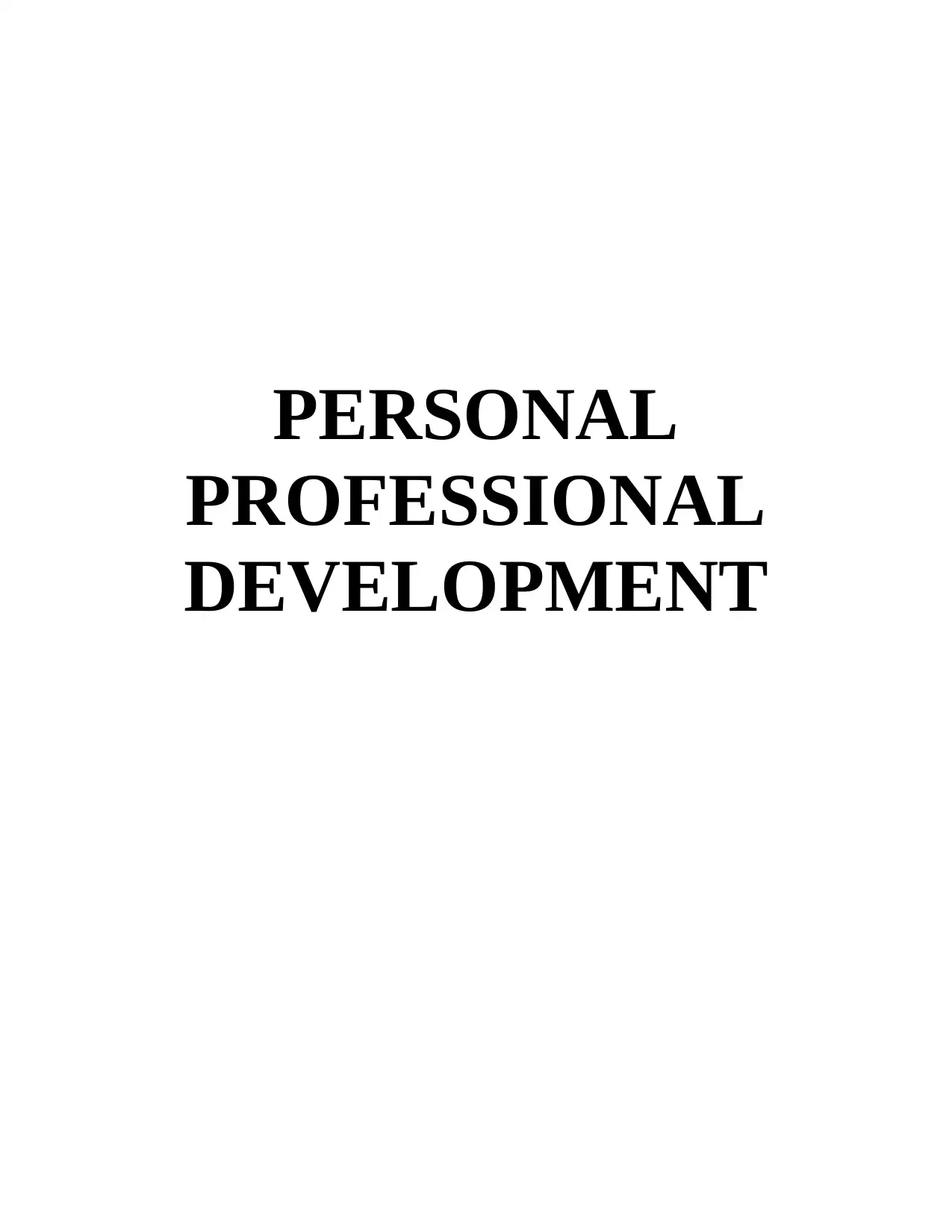
PERSONAL
PROFESSIONAL
DEVELOPMENT
PROFESSIONAL
DEVELOPMENT
Paraphrase This Document
Need a fresh take? Get an instant paraphrase of this document with our AI Paraphraser
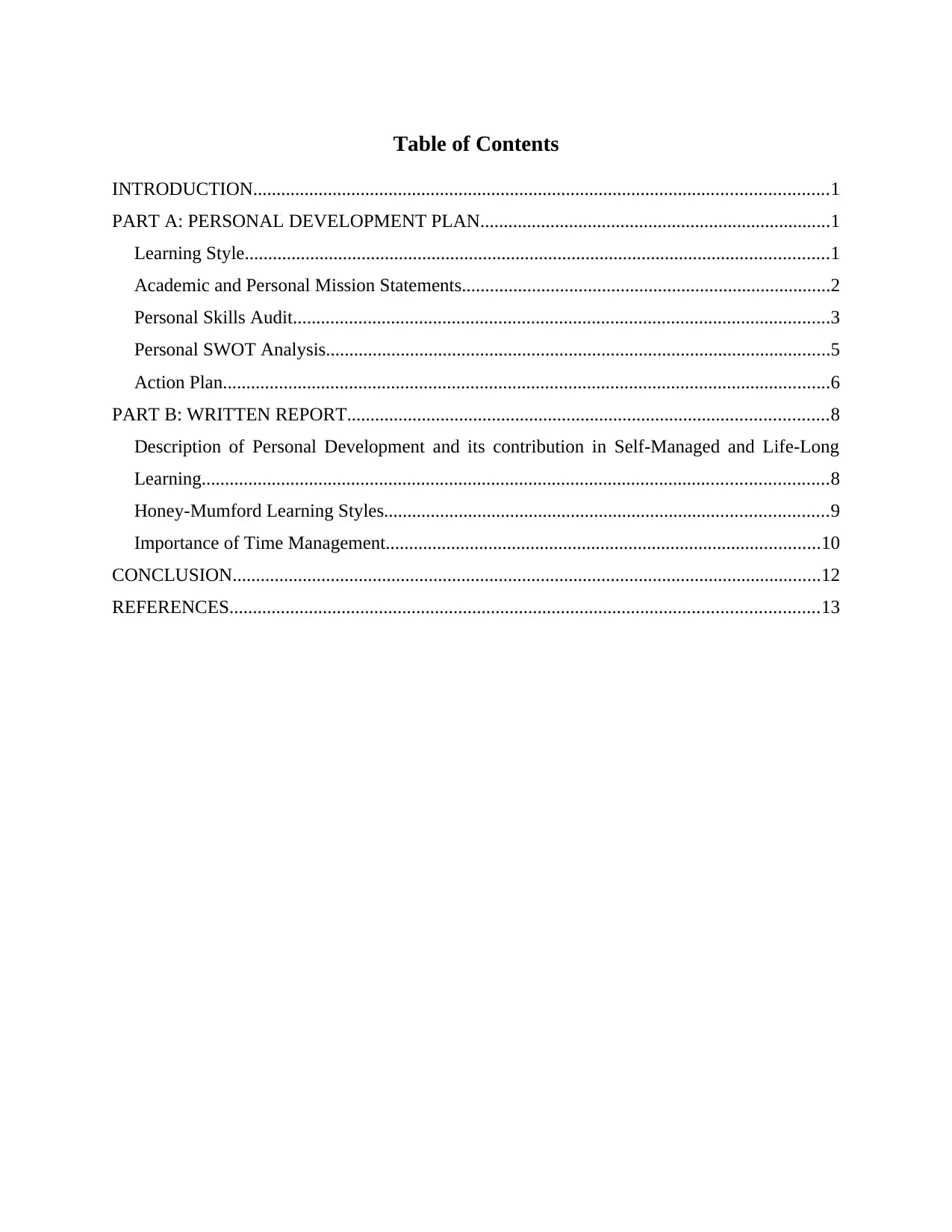
Table of Contents
INTRODUCTION...........................................................................................................................1
PART A: PERSONAL DEVELOPMENT PLAN...........................................................................1
Learning Style.............................................................................................................................1
Academic and Personal Mission Statements...............................................................................2
Personal Skills Audit...................................................................................................................3
Personal SWOT Analysis............................................................................................................5
Action Plan..................................................................................................................................6
PART B: WRITTEN REPORT.......................................................................................................8
Description of Personal Development and its contribution in Self-Managed and Life-Long
Learning......................................................................................................................................8
Honey-Mumford Learning Styles...............................................................................................9
Importance of Time Management.............................................................................................10
CONCLUSION..............................................................................................................................12
REFERENCES..............................................................................................................................13
INTRODUCTION...........................................................................................................................1
PART A: PERSONAL DEVELOPMENT PLAN...........................................................................1
Learning Style.............................................................................................................................1
Academic and Personal Mission Statements...............................................................................2
Personal Skills Audit...................................................................................................................3
Personal SWOT Analysis............................................................................................................5
Action Plan..................................................................................................................................6
PART B: WRITTEN REPORT.......................................................................................................8
Description of Personal Development and its contribution in Self-Managed and Life-Long
Learning......................................................................................................................................8
Honey-Mumford Learning Styles...............................................................................................9
Importance of Time Management.............................................................................................10
CONCLUSION..............................................................................................................................12
REFERENCES..............................................................................................................................13
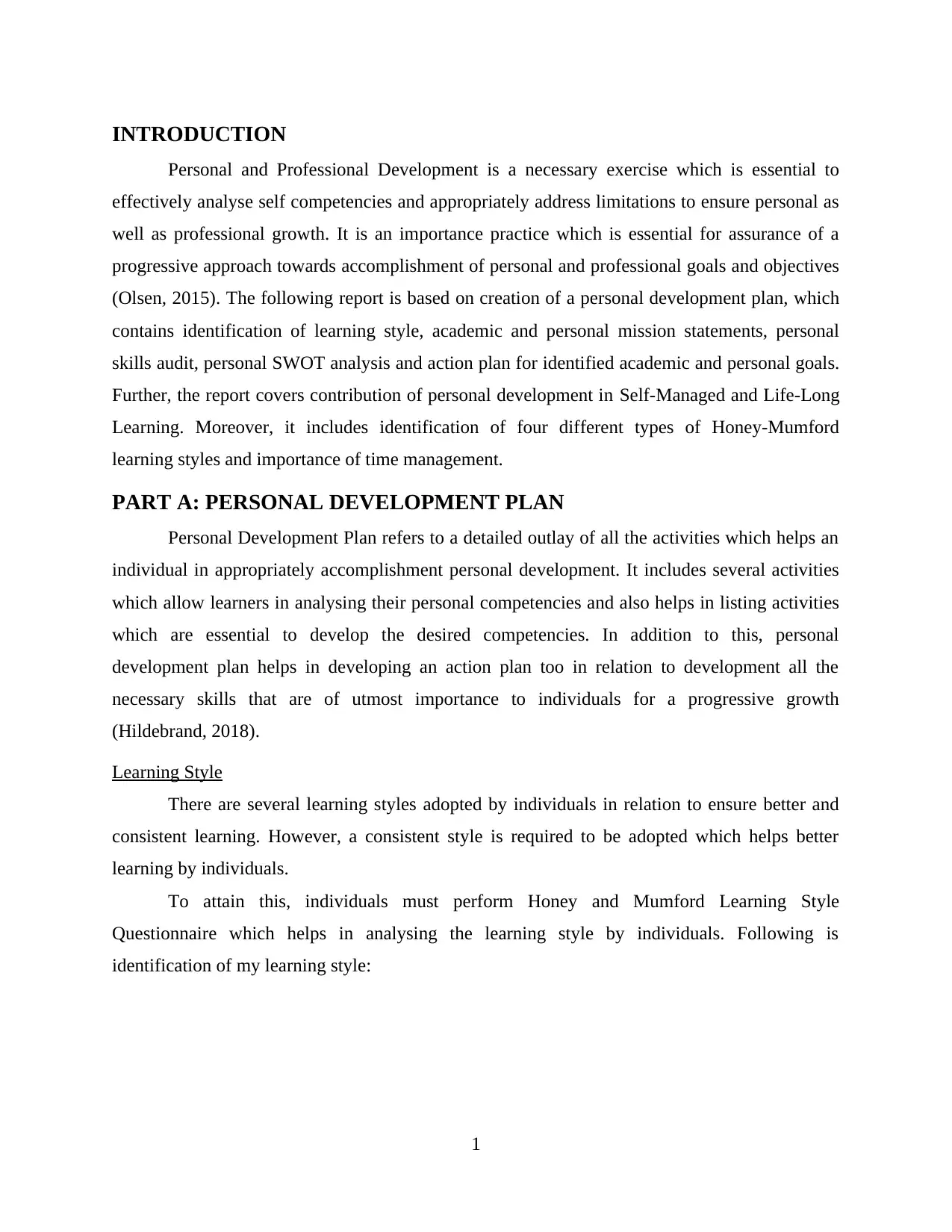
INTRODUCTION
Personal and Professional Development is a necessary exercise which is essential to
effectively analyse self competencies and appropriately address limitations to ensure personal as
well as professional growth. It is an importance practice which is essential for assurance of a
progressive approach towards accomplishment of personal and professional goals and objectives
(Olsen, 2015). The following report is based on creation of a personal development plan, which
contains identification of learning style, academic and personal mission statements, personal
skills audit, personal SWOT analysis and action plan for identified academic and personal goals.
Further, the report covers contribution of personal development in Self-Managed and Life-Long
Learning. Moreover, it includes identification of four different types of Honey-Mumford
learning styles and importance of time management.
PART A: PERSONAL DEVELOPMENT PLAN
Personal Development Plan refers to a detailed outlay of all the activities which helps an
individual in appropriately accomplishment personal development. It includes several activities
which allow learners in analysing their personal competencies and also helps in listing activities
which are essential to develop the desired competencies. In addition to this, personal
development plan helps in developing an action plan too in relation to development all the
necessary skills that are of utmost importance to individuals for a progressive growth
(Hildebrand, 2018).
Learning Style
There are several learning styles adopted by individuals in relation to ensure better and
consistent learning. However, a consistent style is required to be adopted which helps better
learning by individuals.
To attain this, individuals must perform Honey and Mumford Learning Style
Questionnaire which helps in analysing the learning style by individuals. Following is
identification of my learning style:
1
Personal and Professional Development is a necessary exercise which is essential to
effectively analyse self competencies and appropriately address limitations to ensure personal as
well as professional growth. It is an importance practice which is essential for assurance of a
progressive approach towards accomplishment of personal and professional goals and objectives
(Olsen, 2015). The following report is based on creation of a personal development plan, which
contains identification of learning style, academic and personal mission statements, personal
skills audit, personal SWOT analysis and action plan for identified academic and personal goals.
Further, the report covers contribution of personal development in Self-Managed and Life-Long
Learning. Moreover, it includes identification of four different types of Honey-Mumford
learning styles and importance of time management.
PART A: PERSONAL DEVELOPMENT PLAN
Personal Development Plan refers to a detailed outlay of all the activities which helps an
individual in appropriately accomplishment personal development. It includes several activities
which allow learners in analysing their personal competencies and also helps in listing activities
which are essential to develop the desired competencies. In addition to this, personal
development plan helps in developing an action plan too in relation to development all the
necessary skills that are of utmost importance to individuals for a progressive growth
(Hildebrand, 2018).
Learning Style
There are several learning styles adopted by individuals in relation to ensure better and
consistent learning. However, a consistent style is required to be adopted which helps better
learning by individuals.
To attain this, individuals must perform Honey and Mumford Learning Style
Questionnaire which helps in analysing the learning style by individuals. Following is
identification of my learning style:
1
⊘ This is a preview!⊘
Do you want full access?
Subscribe today to unlock all pages.

Trusted by 1+ million students worldwide
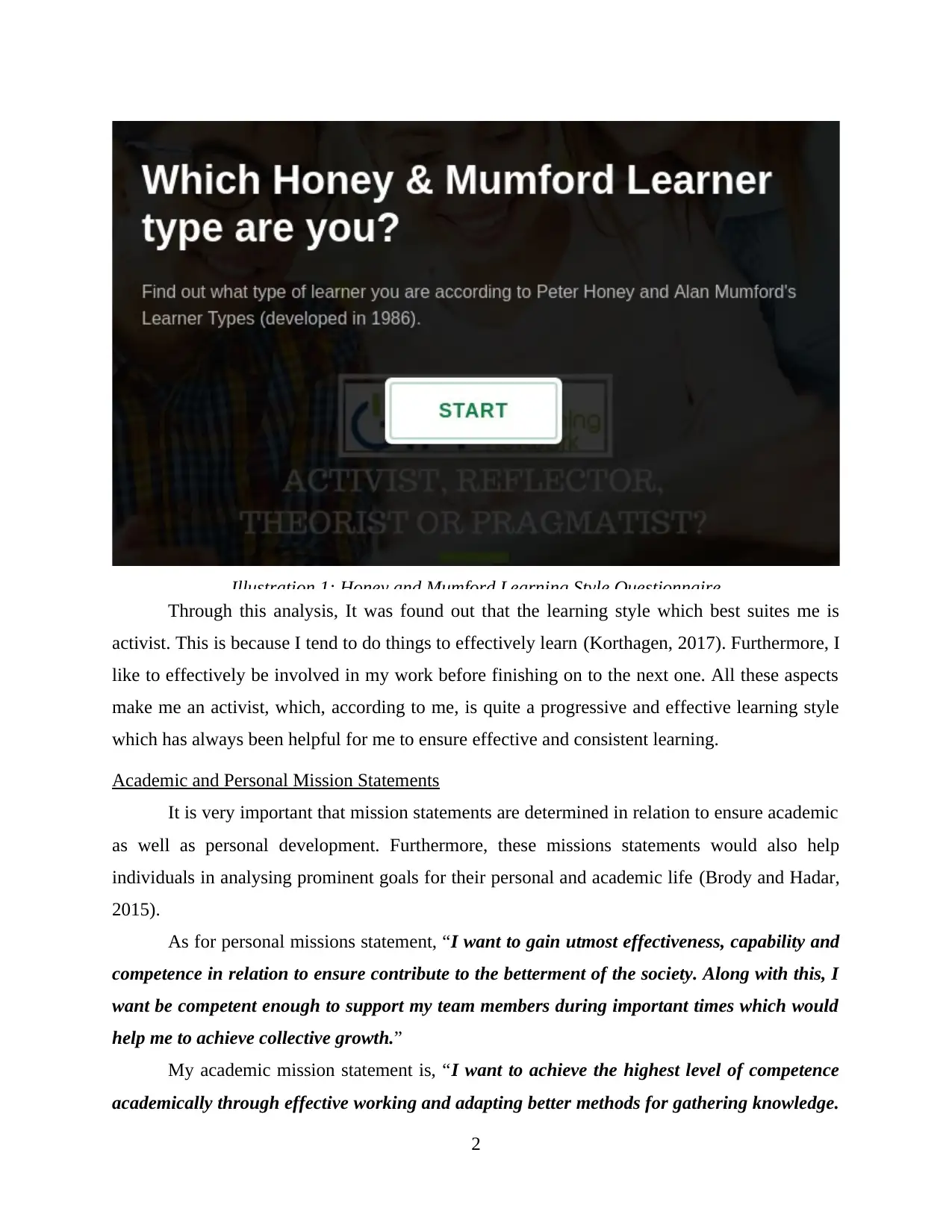
Illustration 1: Honey and Mumford Learning Style Questionnaire
Through this analysis, It was found out that the learning style which best suites me is
activist. This is because I tend to do things to effectively learn (Korthagen, 2017). Furthermore, I
like to effectively be involved in my work before finishing on to the next one. All these aspects
make me an activist, which, according to me, is quite a progressive and effective learning style
which has always been helpful for me to ensure effective and consistent learning.
Academic and Personal Mission Statements
It is very important that mission statements are determined in relation to ensure academic
as well as personal development. Furthermore, these missions statements would also help
individuals in analysing prominent goals for their personal and academic life (Brody and Hadar,
2015).
As for personal missions statement, “I want to gain utmost effectiveness, capability and
competence in relation to ensure contribute to the betterment of the society. Along with this, I
want be competent enough to support my team members during important times which would
help me to achieve collective growth.”
My academic mission statement is, “I want to achieve the highest level of competence
academically through effective working and adapting better methods for gathering knowledge.
2
Through this analysis, It was found out that the learning style which best suites me is
activist. This is because I tend to do things to effectively learn (Korthagen, 2017). Furthermore, I
like to effectively be involved in my work before finishing on to the next one. All these aspects
make me an activist, which, according to me, is quite a progressive and effective learning style
which has always been helpful for me to ensure effective and consistent learning.
Academic and Personal Mission Statements
It is very important that mission statements are determined in relation to ensure academic
as well as personal development. Furthermore, these missions statements would also help
individuals in analysing prominent goals for their personal and academic life (Brody and Hadar,
2015).
As for personal missions statement, “I want to gain utmost effectiveness, capability and
competence in relation to ensure contribute to the betterment of the society. Along with this, I
want be competent enough to support my team members during important times which would
help me to achieve collective growth.”
My academic mission statement is, “I want to achieve the highest level of competence
academically through effective working and adapting better methods for gathering knowledge.
2
Paraphrase This Document
Need a fresh take? Get an instant paraphrase of this document with our AI Paraphraser
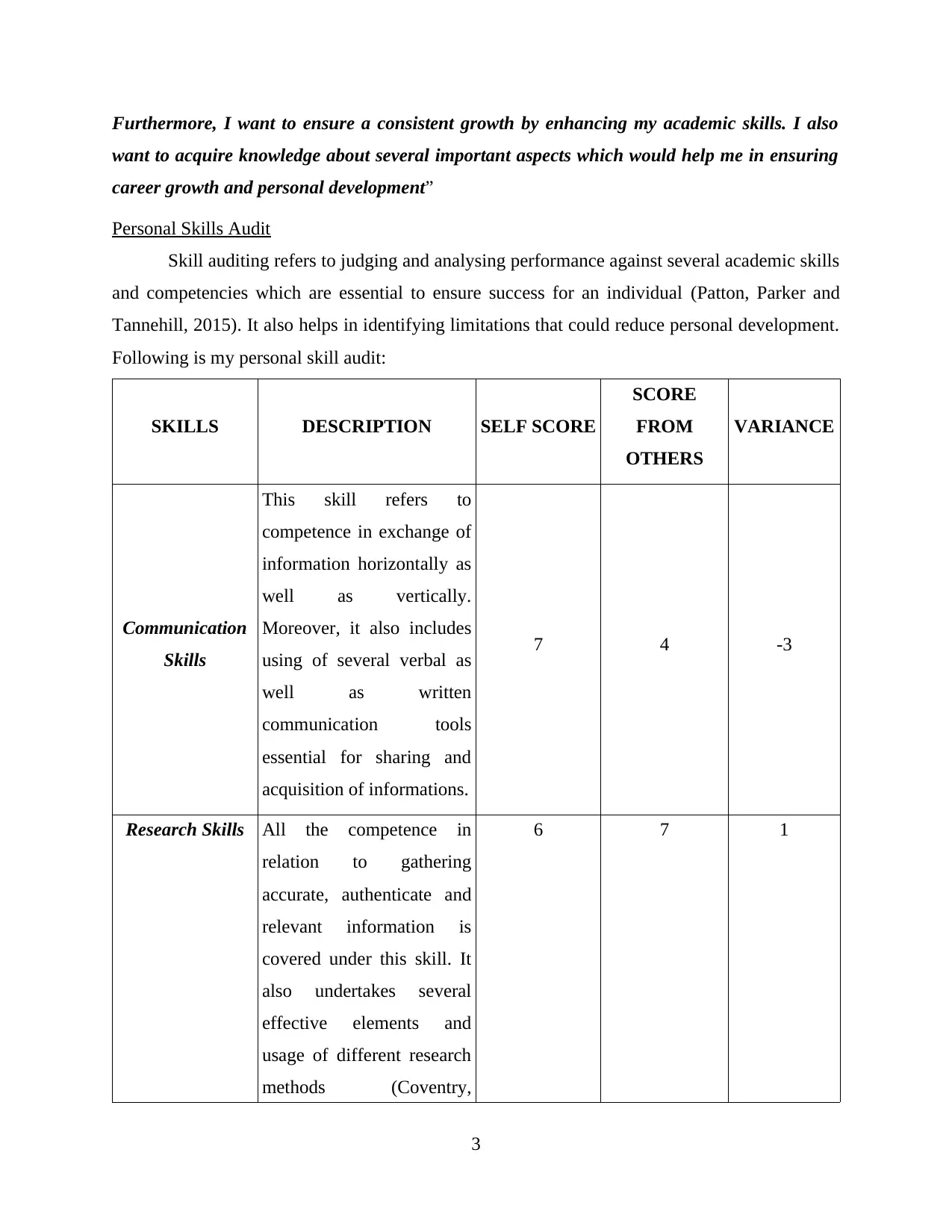
Furthermore, I want to ensure a consistent growth by enhancing my academic skills. I also
want to acquire knowledge about several important aspects which would help me in ensuring
career growth and personal development”
Personal Skills Audit
Skill auditing refers to judging and analysing performance against several academic skills
and competencies which are essential to ensure success for an individual (Patton, Parker and
Tannehill, 2015). It also helps in identifying limitations that could reduce personal development.
Following is my personal skill audit:
SKILLS DESCRIPTION SELF SCORE
SCORE
FROM
OTHERS
VARIANCE
Communication
Skills
This skill refers to
competence in exchange of
information horizontally as
well as vertically.
Moreover, it also includes
using of several verbal as
well as written
communication tools
essential for sharing and
acquisition of informations.
7 4 -3
Research Skills All the competence in
relation to gathering
accurate, authenticate and
relevant information is
covered under this skill. It
also undertakes several
effective elements and
usage of different research
methods (Coventry,
6 7 1
3
want to acquire knowledge about several important aspects which would help me in ensuring
career growth and personal development”
Personal Skills Audit
Skill auditing refers to judging and analysing performance against several academic skills
and competencies which are essential to ensure success for an individual (Patton, Parker and
Tannehill, 2015). It also helps in identifying limitations that could reduce personal development.
Following is my personal skill audit:
SKILLS DESCRIPTION SELF SCORE
SCORE
FROM
OTHERS
VARIANCE
Communication
Skills
This skill refers to
competence in exchange of
information horizontally as
well as vertically.
Moreover, it also includes
using of several verbal as
well as written
communication tools
essential for sharing and
acquisition of informations.
7 4 -3
Research Skills All the competence in
relation to gathering
accurate, authenticate and
relevant information is
covered under this skill. It
also undertakes several
effective elements and
usage of different research
methods (Coventry,
6 7 1
3
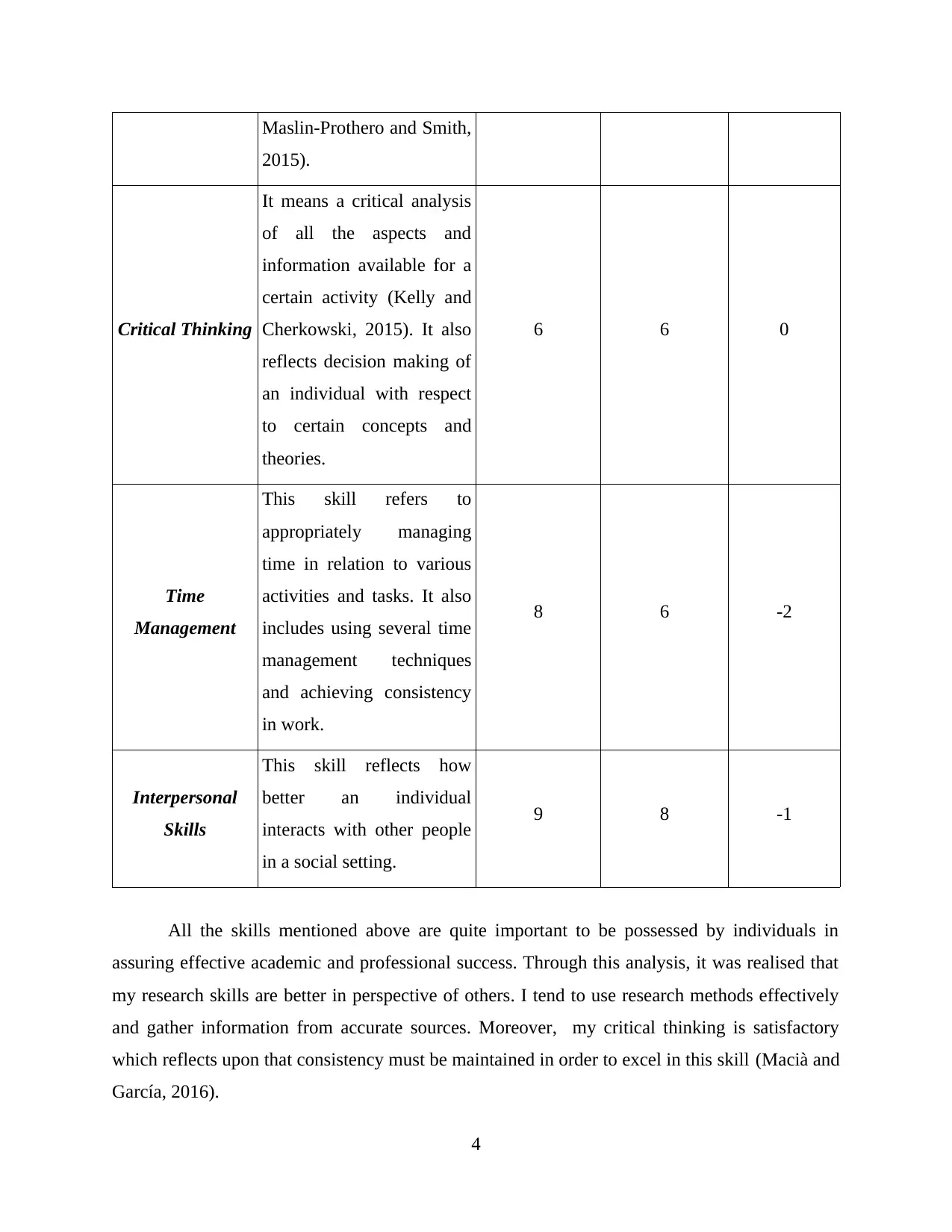
Maslin‐Prothero and Smith,
2015).
Critical Thinking
It means a critical analysis
of all the aspects and
information available for a
certain activity (Kelly and
Cherkowski, 2015). It also
reflects decision making of
an individual with respect
to certain concepts and
theories.
6 6 0
Time
Management
This skill refers to
appropriately managing
time in relation to various
activities and tasks. It also
includes using several time
management techniques
and achieving consistency
in work.
8 6 -2
Interpersonal
Skills
This skill reflects how
better an individual
interacts with other people
in a social setting.
9 8 -1
All the skills mentioned above are quite important to be possessed by individuals in
assuring effective academic and professional success. Through this analysis, it was realised that
my research skills are better in perspective of others. I tend to use research methods effectively
and gather information from accurate sources. Moreover, my critical thinking is satisfactory
which reflects upon that consistency must be maintained in order to excel in this skill (Macià and
García, 2016).
4
2015).
Critical Thinking
It means a critical analysis
of all the aspects and
information available for a
certain activity (Kelly and
Cherkowski, 2015). It also
reflects decision making of
an individual with respect
to certain concepts and
theories.
6 6 0
Time
Management
This skill refers to
appropriately managing
time in relation to various
activities and tasks. It also
includes using several time
management techniques
and achieving consistency
in work.
8 6 -2
Interpersonal
Skills
This skill reflects how
better an individual
interacts with other people
in a social setting.
9 8 -1
All the skills mentioned above are quite important to be possessed by individuals in
assuring effective academic and professional success. Through this analysis, it was realised that
my research skills are better in perspective of others. I tend to use research methods effectively
and gather information from accurate sources. Moreover, my critical thinking is satisfactory
which reflects upon that consistency must be maintained in order to excel in this skill (Macià and
García, 2016).
4
⊘ This is a preview!⊘
Do you want full access?
Subscribe today to unlock all pages.

Trusted by 1+ million students worldwide
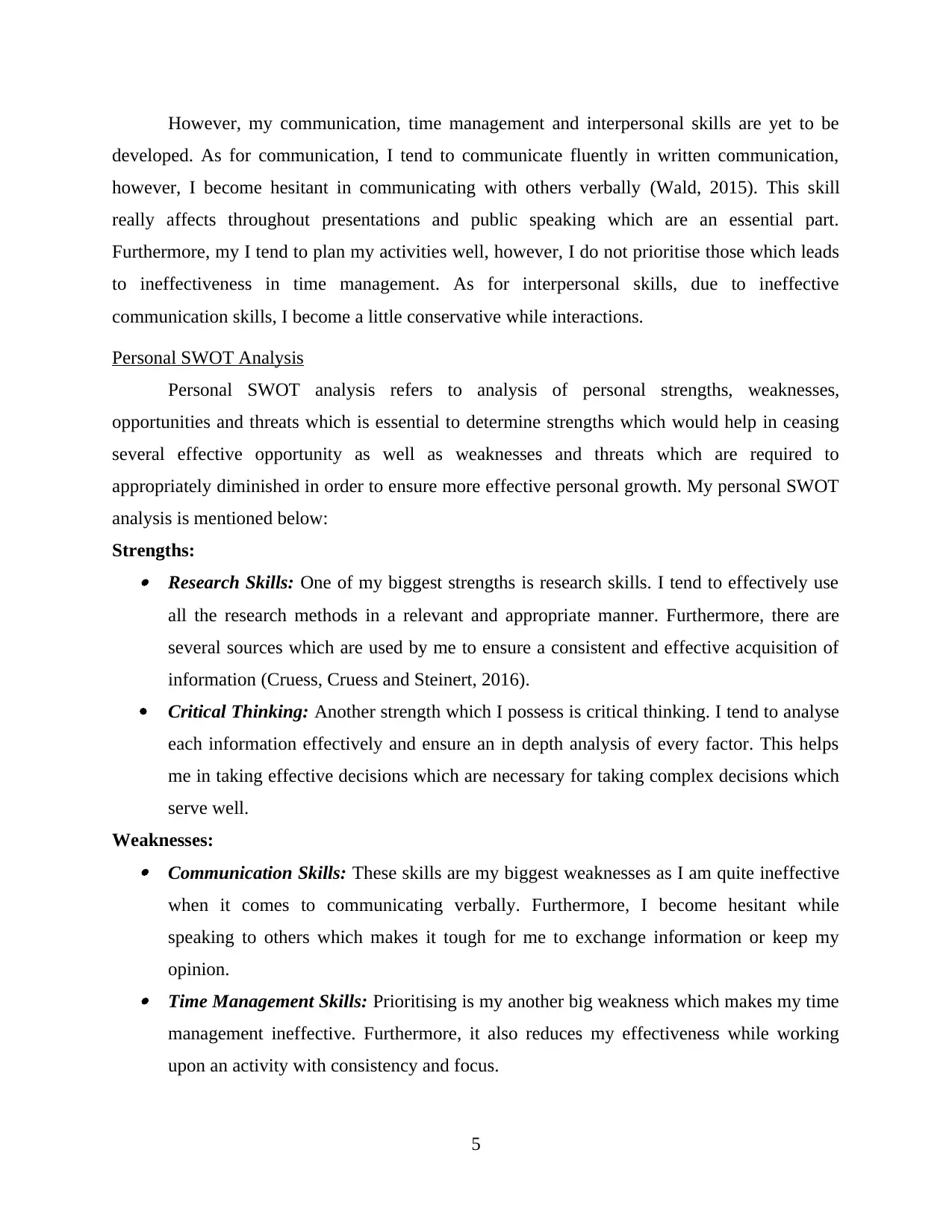
However, my communication, time management and interpersonal skills are yet to be
developed. As for communication, I tend to communicate fluently in written communication,
however, I become hesitant in communicating with others verbally (Wald, 2015). This skill
really affects throughout presentations and public speaking which are an essential part.
Furthermore, my I tend to plan my activities well, however, I do not prioritise those which leads
to ineffectiveness in time management. As for interpersonal skills, due to ineffective
communication skills, I become a little conservative while interactions.
Personal SWOT Analysis
Personal SWOT analysis refers to analysis of personal strengths, weaknesses,
opportunities and threats which is essential to determine strengths which would help in ceasing
several effective opportunity as well as weaknesses and threats which are required to
appropriately diminished in order to ensure more effective personal growth. My personal SWOT
analysis is mentioned below:
Strengths: Research Skills: One of my biggest strengths is research skills. I tend to effectively use
all the research methods in a relevant and appropriate manner. Furthermore, there are
several sources which are used by me to ensure a consistent and effective acquisition of
information (Cruess, Cruess and Steinert, 2016).
Critical Thinking: Another strength which I possess is critical thinking. I tend to analyse
each information effectively and ensure an in depth analysis of every factor. This helps
me in taking effective decisions which are necessary for taking complex decisions which
serve well.
Weaknesses: Communication Skills: These skills are my biggest weaknesses as I am quite ineffective
when it comes to communicating verbally. Furthermore, I become hesitant while
speaking to others which makes it tough for me to exchange information or keep my
opinion. Time Management Skills: Prioritising is my another big weakness which makes my time
management ineffective. Furthermore, it also reduces my effectiveness while working
upon an activity with consistency and focus.
5
developed. As for communication, I tend to communicate fluently in written communication,
however, I become hesitant in communicating with others verbally (Wald, 2015). This skill
really affects throughout presentations and public speaking which are an essential part.
Furthermore, my I tend to plan my activities well, however, I do not prioritise those which leads
to ineffectiveness in time management. As for interpersonal skills, due to ineffective
communication skills, I become a little conservative while interactions.
Personal SWOT Analysis
Personal SWOT analysis refers to analysis of personal strengths, weaknesses,
opportunities and threats which is essential to determine strengths which would help in ceasing
several effective opportunity as well as weaknesses and threats which are required to
appropriately diminished in order to ensure more effective personal growth. My personal SWOT
analysis is mentioned below:
Strengths: Research Skills: One of my biggest strengths is research skills. I tend to effectively use
all the research methods in a relevant and appropriate manner. Furthermore, there are
several sources which are used by me to ensure a consistent and effective acquisition of
information (Cruess, Cruess and Steinert, 2016).
Critical Thinking: Another strength which I possess is critical thinking. I tend to analyse
each information effectively and ensure an in depth analysis of every factor. This helps
me in taking effective decisions which are necessary for taking complex decisions which
serve well.
Weaknesses: Communication Skills: These skills are my biggest weaknesses as I am quite ineffective
when it comes to communicating verbally. Furthermore, I become hesitant while
speaking to others which makes it tough for me to exchange information or keep my
opinion. Time Management Skills: Prioritising is my another big weakness which makes my time
management ineffective. Furthermore, it also reduces my effectiveness while working
upon an activity with consistency and focus.
5
Paraphrase This Document
Need a fresh take? Get an instant paraphrase of this document with our AI Paraphraser
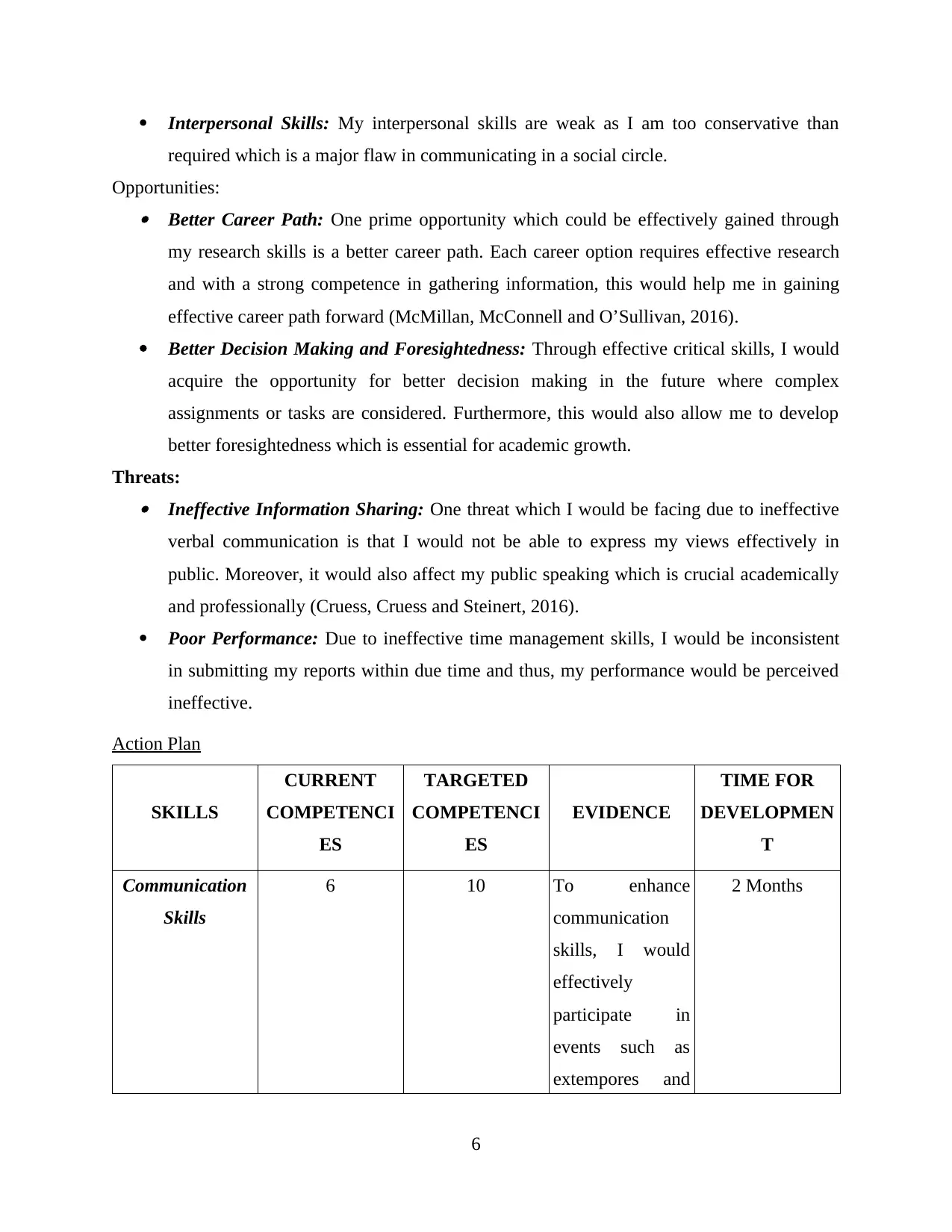
Interpersonal Skills: My interpersonal skills are weak as I am too conservative than
required which is a major flaw in communicating in a social circle.
Opportunities: Better Career Path: One prime opportunity which could be effectively gained through
my research skills is a better career path. Each career option requires effective research
and with a strong competence in gathering information, this would help me in gaining
effective career path forward (McMillan, McConnell and O’Sullivan, 2016).
Better Decision Making and Foresightedness: Through effective critical skills, I would
acquire the opportunity for better decision making in the future where complex
assignments or tasks are considered. Furthermore, this would also allow me to develop
better foresightedness which is essential for academic growth.
Threats: Ineffective Information Sharing: One threat which I would be facing due to ineffective
verbal communication is that I would not be able to express my views effectively in
public. Moreover, it would also affect my public speaking which is crucial academically
and professionally (Cruess, Cruess and Steinert, 2016).
Poor Performance: Due to ineffective time management skills, I would be inconsistent
in submitting my reports within due time and thus, my performance would be perceived
ineffective.
Action Plan
SKILLS
CURRENT
COMPETENCI
ES
TARGETED
COMPETENCI
ES
EVIDENCE
TIME FOR
DEVELOPMEN
T
Communication
Skills
6 10 To enhance
communication
skills, I would
effectively
participate in
events such as
extempores and
2 Months
6
required which is a major flaw in communicating in a social circle.
Opportunities: Better Career Path: One prime opportunity which could be effectively gained through
my research skills is a better career path. Each career option requires effective research
and with a strong competence in gathering information, this would help me in gaining
effective career path forward (McMillan, McConnell and O’Sullivan, 2016).
Better Decision Making and Foresightedness: Through effective critical skills, I would
acquire the opportunity for better decision making in the future where complex
assignments or tasks are considered. Furthermore, this would also allow me to develop
better foresightedness which is essential for academic growth.
Threats: Ineffective Information Sharing: One threat which I would be facing due to ineffective
verbal communication is that I would not be able to express my views effectively in
public. Moreover, it would also affect my public speaking which is crucial academically
and professionally (Cruess, Cruess and Steinert, 2016).
Poor Performance: Due to ineffective time management skills, I would be inconsistent
in submitting my reports within due time and thus, my performance would be perceived
ineffective.
Action Plan
SKILLS
CURRENT
COMPETENCI
ES
TARGETED
COMPETENCI
ES
EVIDENCE
TIME FOR
DEVELOPMEN
T
Communication
Skills
6 10 To enhance
communication
skills, I would
effectively
participate in
events such as
extempores and
2 Months
6
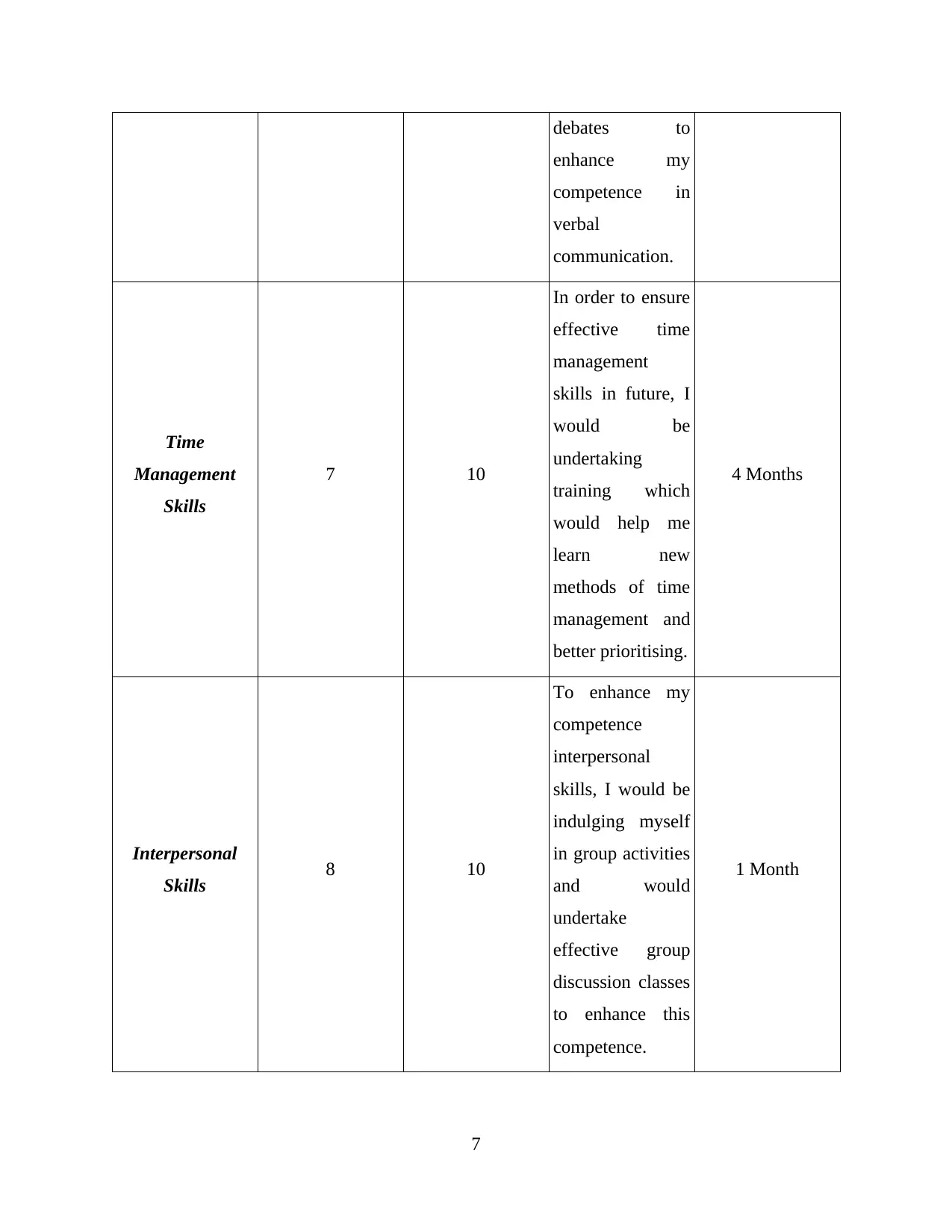
debates to
enhance my
competence in
verbal
communication.
Time
Management
Skills
7 10
In order to ensure
effective time
management
skills in future, I
would be
undertaking
training which
would help me
learn new
methods of time
management and
better prioritising.
4 Months
Interpersonal
Skills 8 10
To enhance my
competence
interpersonal
skills, I would be
indulging myself
in group activities
and would
undertake
effective group
discussion classes
to enhance this
competence.
1 Month
7
enhance my
competence in
verbal
communication.
Time
Management
Skills
7 10
In order to ensure
effective time
management
skills in future, I
would be
undertaking
training which
would help me
learn new
methods of time
management and
better prioritising.
4 Months
Interpersonal
Skills 8 10
To enhance my
competence
interpersonal
skills, I would be
indulging myself
in group activities
and would
undertake
effective group
discussion classes
to enhance this
competence.
1 Month
7
⊘ This is a preview!⊘
Do you want full access?
Subscribe today to unlock all pages.

Trusted by 1+ million students worldwide
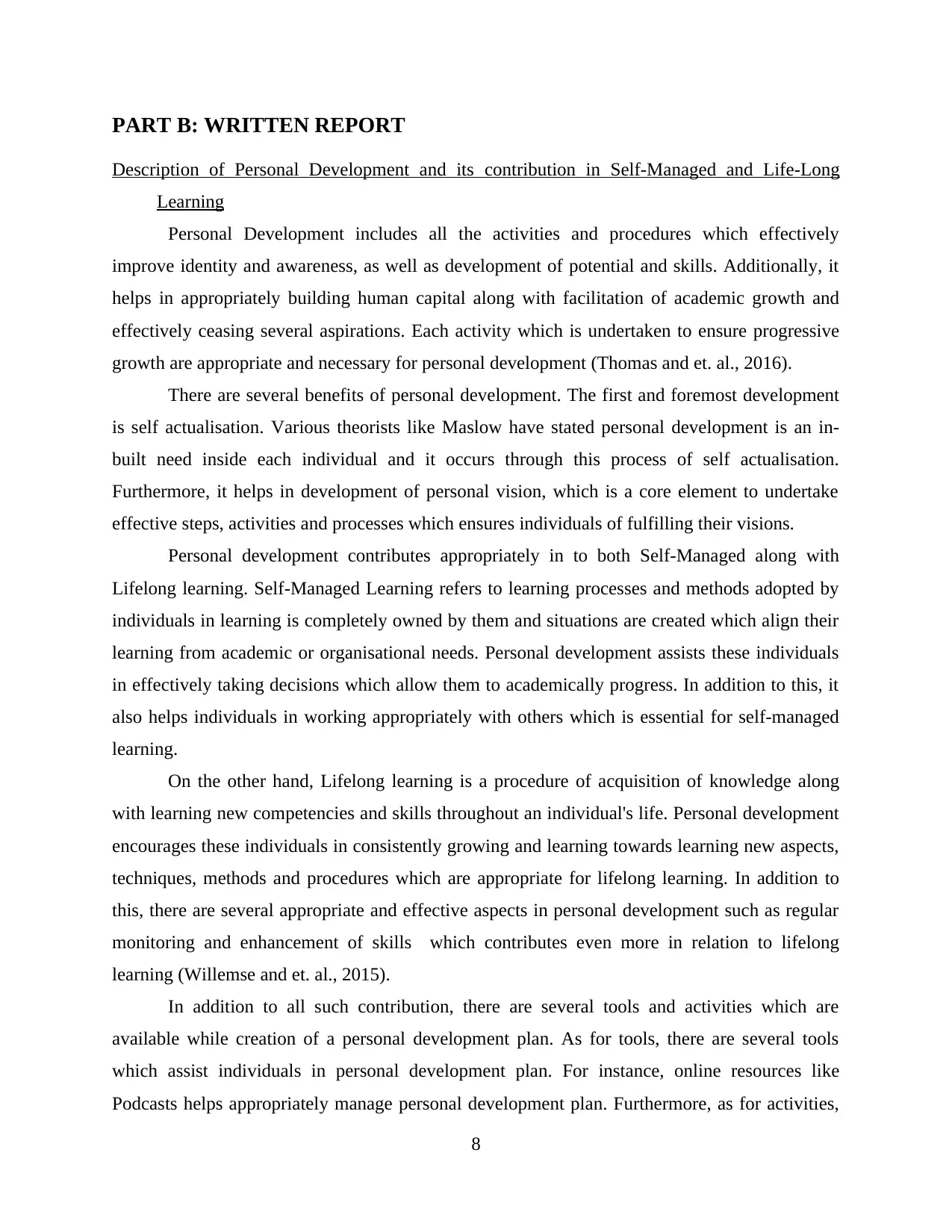
PART B: WRITTEN REPORT
Description of Personal Development and its contribution in Self-Managed and Life-Long
Learning
Personal Development includes all the activities and procedures which effectively
improve identity and awareness, as well as development of potential and skills. Additionally, it
helps in appropriately building human capital along with facilitation of academic growth and
effectively ceasing several aspirations. Each activity which is undertaken to ensure progressive
growth are appropriate and necessary for personal development (Thomas and et. al., 2016).
There are several benefits of personal development. The first and foremost development
is self actualisation. Various theorists like Maslow have stated personal development is an in-
built need inside each individual and it occurs through this process of self actualisation.
Furthermore, it helps in development of personal vision, which is a core element to undertake
effective steps, activities and processes which ensures individuals of fulfilling their visions.
Personal development contributes appropriately in to both Self-Managed along with
Lifelong learning. Self-Managed Learning refers to learning processes and methods adopted by
individuals in learning is completely owned by them and situations are created which align their
learning from academic or organisational needs. Personal development assists these individuals
in effectively taking decisions which allow them to academically progress. In addition to this, it
also helps individuals in working appropriately with others which is essential for self-managed
learning.
On the other hand, Lifelong learning is a procedure of acquisition of knowledge along
with learning new competencies and skills throughout an individual's life. Personal development
encourages these individuals in consistently growing and learning towards learning new aspects,
techniques, methods and procedures which are appropriate for lifelong learning. In addition to
this, there are several appropriate and effective aspects in personal development such as regular
monitoring and enhancement of skills which contributes even more in relation to lifelong
learning (Willemse and et. al., 2015).
In addition to all such contribution, there are several tools and activities which are
available while creation of a personal development plan. As for tools, there are several tools
which assist individuals in personal development plan. For instance, online resources like
Podcasts helps appropriately manage personal development plan. Furthermore, as for activities,
8
Description of Personal Development and its contribution in Self-Managed and Life-Long
Learning
Personal Development includes all the activities and procedures which effectively
improve identity and awareness, as well as development of potential and skills. Additionally, it
helps in appropriately building human capital along with facilitation of academic growth and
effectively ceasing several aspirations. Each activity which is undertaken to ensure progressive
growth are appropriate and necessary for personal development (Thomas and et. al., 2016).
There are several benefits of personal development. The first and foremost development
is self actualisation. Various theorists like Maslow have stated personal development is an in-
built need inside each individual and it occurs through this process of self actualisation.
Furthermore, it helps in development of personal vision, which is a core element to undertake
effective steps, activities and processes which ensures individuals of fulfilling their visions.
Personal development contributes appropriately in to both Self-Managed along with
Lifelong learning. Self-Managed Learning refers to learning processes and methods adopted by
individuals in learning is completely owned by them and situations are created which align their
learning from academic or organisational needs. Personal development assists these individuals
in effectively taking decisions which allow them to academically progress. In addition to this, it
also helps individuals in working appropriately with others which is essential for self-managed
learning.
On the other hand, Lifelong learning is a procedure of acquisition of knowledge along
with learning new competencies and skills throughout an individual's life. Personal development
encourages these individuals in consistently growing and learning towards learning new aspects,
techniques, methods and procedures which are appropriate for lifelong learning. In addition to
this, there are several appropriate and effective aspects in personal development such as regular
monitoring and enhancement of skills which contributes even more in relation to lifelong
learning (Willemse and et. al., 2015).
In addition to all such contribution, there are several tools and activities which are
available while creation of a personal development plan. As for tools, there are several tools
which assist individuals in personal development plan. For instance, online resources like
Podcasts helps appropriately manage personal development plan. Furthermore, as for activities,
8
Paraphrase This Document
Need a fresh take? Get an instant paraphrase of this document with our AI Paraphraser
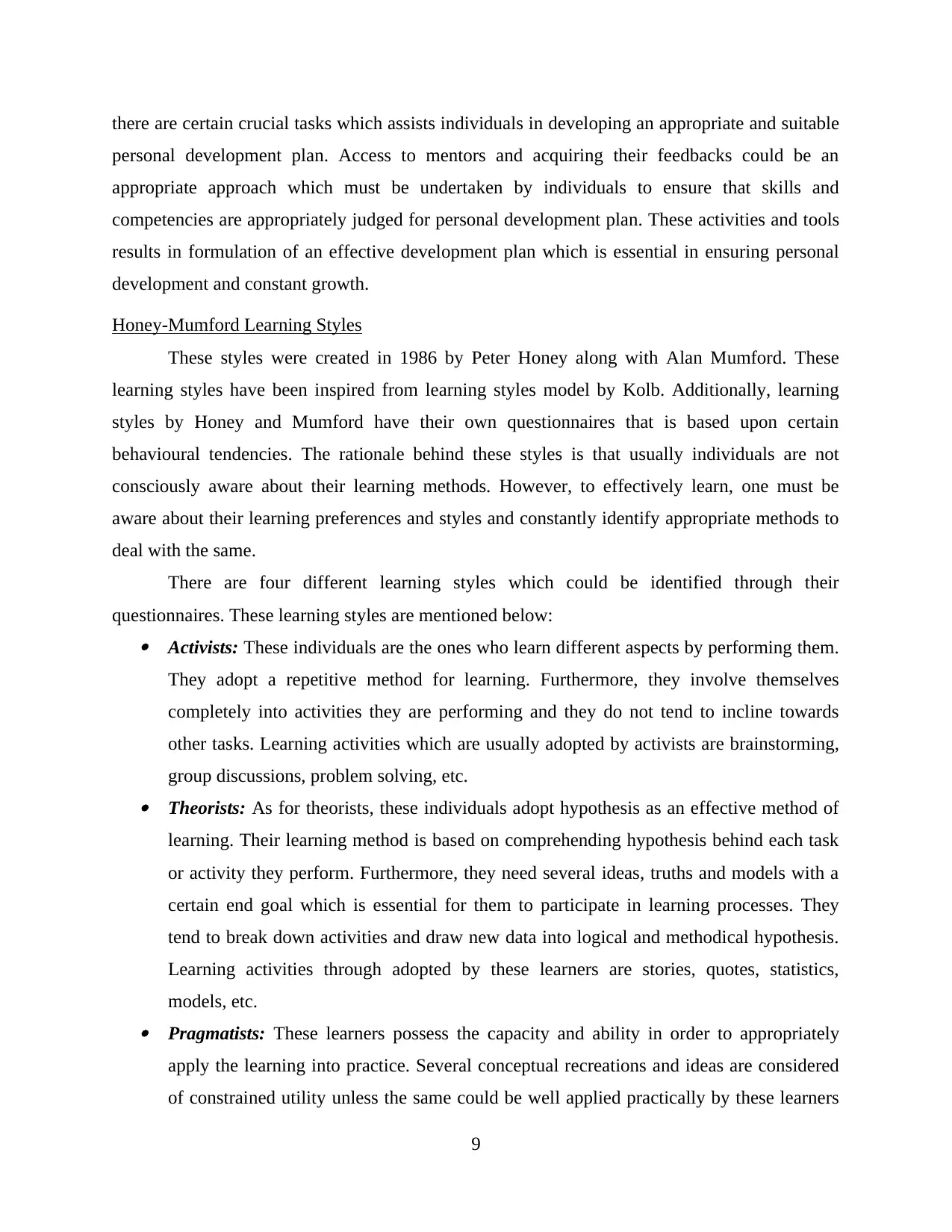
there are certain crucial tasks which assists individuals in developing an appropriate and suitable
personal development plan. Access to mentors and acquiring their feedbacks could be an
appropriate approach which must be undertaken by individuals to ensure that skills and
competencies are appropriately judged for personal development plan. These activities and tools
results in formulation of an effective development plan which is essential in ensuring personal
development and constant growth.
Honey-Mumford Learning Styles
These styles were created in 1986 by Peter Honey along with Alan Mumford. These
learning styles have been inspired from learning styles model by Kolb. Additionally, learning
styles by Honey and Mumford have their own questionnaires that is based upon certain
behavioural tendencies. The rationale behind these styles is that usually individuals are not
consciously aware about their learning methods. However, to effectively learn, one must be
aware about their learning preferences and styles and constantly identify appropriate methods to
deal with the same.
There are four different learning styles which could be identified through their
questionnaires. These learning styles are mentioned below: Activists: These individuals are the ones who learn different aspects by performing them.
They adopt a repetitive method for learning. Furthermore, they involve themselves
completely into activities they are performing and they do not tend to incline towards
other tasks. Learning activities which are usually adopted by activists are brainstorming,
group discussions, problem solving, etc. Theorists: As for theorists, these individuals adopt hypothesis as an effective method of
learning. Their learning method is based on comprehending hypothesis behind each task
or activity they perform. Furthermore, they need several ideas, truths and models with a
certain end goal which is essential for them to participate in learning processes. They
tend to break down activities and draw new data into logical and methodical hypothesis.
Learning activities through adopted by these learners are stories, quotes, statistics,
models, etc. Pragmatists: These learners possess the capacity and ability in order to appropriately
apply the learning into practice. Several conceptual recreations and ideas are considered
of constrained utility unless the same could be well applied practically by these learners
9
personal development plan. Access to mentors and acquiring their feedbacks could be an
appropriate approach which must be undertaken by individuals to ensure that skills and
competencies are appropriately judged for personal development plan. These activities and tools
results in formulation of an effective development plan which is essential in ensuring personal
development and constant growth.
Honey-Mumford Learning Styles
These styles were created in 1986 by Peter Honey along with Alan Mumford. These
learning styles have been inspired from learning styles model by Kolb. Additionally, learning
styles by Honey and Mumford have their own questionnaires that is based upon certain
behavioural tendencies. The rationale behind these styles is that usually individuals are not
consciously aware about their learning methods. However, to effectively learn, one must be
aware about their learning preferences and styles and constantly identify appropriate methods to
deal with the same.
There are four different learning styles which could be identified through their
questionnaires. These learning styles are mentioned below: Activists: These individuals are the ones who learn different aspects by performing them.
They adopt a repetitive method for learning. Furthermore, they involve themselves
completely into activities they are performing and they do not tend to incline towards
other tasks. Learning activities which are usually adopted by activists are brainstorming,
group discussions, problem solving, etc. Theorists: As for theorists, these individuals adopt hypothesis as an effective method of
learning. Their learning method is based on comprehending hypothesis behind each task
or activity they perform. Furthermore, they need several ideas, truths and models with a
certain end goal which is essential for them to participate in learning processes. They
tend to break down activities and draw new data into logical and methodical hypothesis.
Learning activities through adopted by these learners are stories, quotes, statistics,
models, etc. Pragmatists: These learners possess the capacity and ability in order to appropriately
apply the learning into practice. Several conceptual recreations and ideas are considered
of constrained utility unless the same could be well applied practically by these learners
9
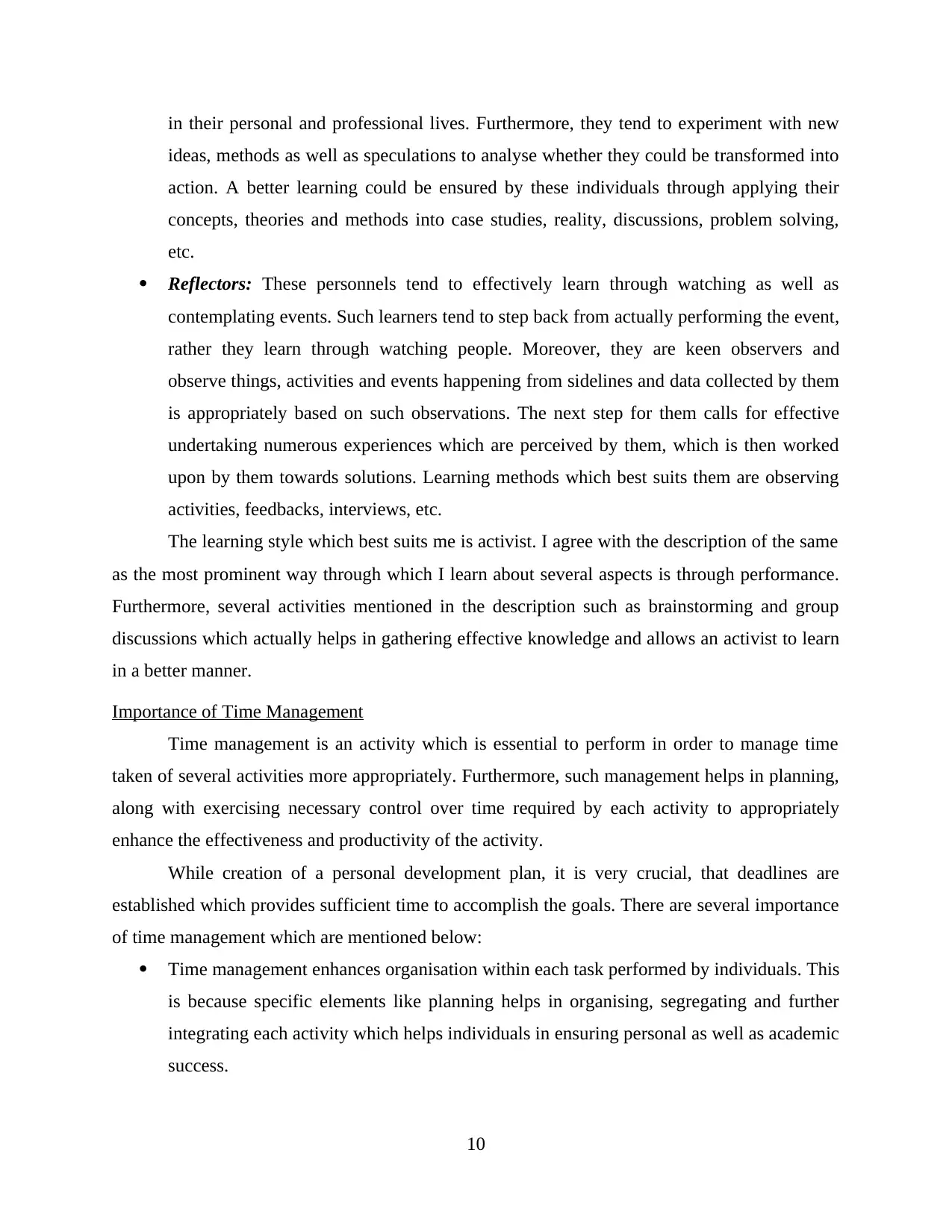
in their personal and professional lives. Furthermore, they tend to experiment with new
ideas, methods as well as speculations to analyse whether they could be transformed into
action. A better learning could be ensured by these individuals through applying their
concepts, theories and methods into case studies, reality, discussions, problem solving,
etc.
Reflectors: These personnels tend to effectively learn through watching as well as
contemplating events. Such learners tend to step back from actually performing the event,
rather they learn through watching people. Moreover, they are keen observers and
observe things, activities and events happening from sidelines and data collected by them
is appropriately based on such observations. The next step for them calls for effective
undertaking numerous experiences which are perceived by them, which is then worked
upon by them towards solutions. Learning methods which best suits them are observing
activities, feedbacks, interviews, etc.
The learning style which best suits me is activist. I agree with the description of the same
as the most prominent way through which I learn about several aspects is through performance.
Furthermore, several activities mentioned in the description such as brainstorming and group
discussions which actually helps in gathering effective knowledge and allows an activist to learn
in a better manner.
Importance of Time Management
Time management is an activity which is essential to perform in order to manage time
taken of several activities more appropriately. Furthermore, such management helps in planning,
along with exercising necessary control over time required by each activity to appropriately
enhance the effectiveness and productivity of the activity.
While creation of a personal development plan, it is very crucial, that deadlines are
established which provides sufficient time to accomplish the goals. There are several importance
of time management which are mentioned below:
Time management enhances organisation within each task performed by individuals. This
is because specific elements like planning helps in organising, segregating and further
integrating each activity which helps individuals in ensuring personal as well as academic
success.
10
ideas, methods as well as speculations to analyse whether they could be transformed into
action. A better learning could be ensured by these individuals through applying their
concepts, theories and methods into case studies, reality, discussions, problem solving,
etc.
Reflectors: These personnels tend to effectively learn through watching as well as
contemplating events. Such learners tend to step back from actually performing the event,
rather they learn through watching people. Moreover, they are keen observers and
observe things, activities and events happening from sidelines and data collected by them
is appropriately based on such observations. The next step for them calls for effective
undertaking numerous experiences which are perceived by them, which is then worked
upon by them towards solutions. Learning methods which best suits them are observing
activities, feedbacks, interviews, etc.
The learning style which best suits me is activist. I agree with the description of the same
as the most prominent way through which I learn about several aspects is through performance.
Furthermore, several activities mentioned in the description such as brainstorming and group
discussions which actually helps in gathering effective knowledge and allows an activist to learn
in a better manner.
Importance of Time Management
Time management is an activity which is essential to perform in order to manage time
taken of several activities more appropriately. Furthermore, such management helps in planning,
along with exercising necessary control over time required by each activity to appropriately
enhance the effectiveness and productivity of the activity.
While creation of a personal development plan, it is very crucial, that deadlines are
established which provides sufficient time to accomplish the goals. There are several importance
of time management which are mentioned below:
Time management enhances organisation within each task performed by individuals. This
is because specific elements like planning helps in organising, segregating and further
integrating each activity which helps individuals in ensuring personal as well as academic
success.
10
⊘ This is a preview!⊘
Do you want full access?
Subscribe today to unlock all pages.

Trusted by 1+ million students worldwide
1 out of 15
Related Documents
Your All-in-One AI-Powered Toolkit for Academic Success.
+13062052269
info@desklib.com
Available 24*7 on WhatsApp / Email
![[object Object]](/_next/static/media/star-bottom.7253800d.svg)
Unlock your academic potential
Copyright © 2020–2026 A2Z Services. All Rights Reserved. Developed and managed by ZUCOL.





